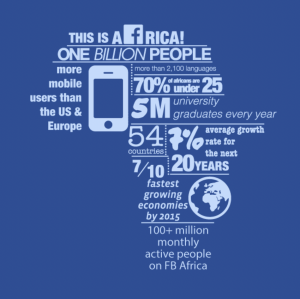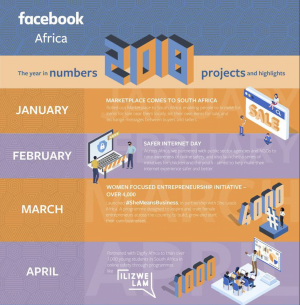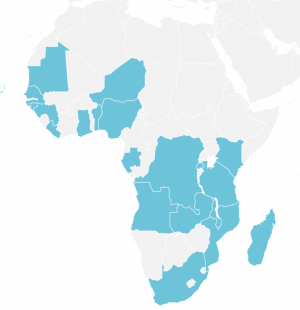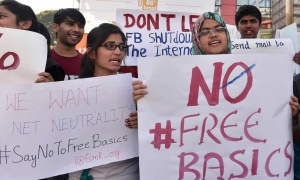Difference between revisions of "Facebook in Africa"
| Line 20: | Line 20: | ||
==Ethical Concerns== | ==Ethical Concerns== | ||
| − | The initial purpose of Internet.org, according to [https://en.wikipedia.org/wiki/Mark_Zuckerberg Mark Zuckerberg], was to offer users free access to news and other practical information and services | + | The initial purpose of Internet.org, according to [https://en.wikipedia.org/wiki/Mark_Zuckerberg Mark Zuckerberg], was to offer users free access to news and other practical information and services the reality of this program is that users are not receiving the information that they need and in limited ways.<br /> |
Moreover, internet users in Africa have significantly fewer options and online freedoms than users in America do. The ideas of [http://si410wiki.sites.uofmhosting.net/index.php/Fake_News fake news], privacy, information transparency, and digital embodiment are all foreign concepts in Africa. <br /> | Moreover, internet users in Africa have significantly fewer options and online freedoms than users in America do. The ideas of [http://si410wiki.sites.uofmhosting.net/index.php/Fake_News fake news], privacy, information transparency, and digital embodiment are all foreign concepts in Africa. <br /> | ||
Revision as of 13:04, 28 April 2019
Facebook in Africa differs from Facebook in the Western world. In Western cultures, Facebook is seen as a social media platform that allows users to connect with old friends and share content. On the African continent, Facebook has had a different impact. Facebook is trying to lead the movement towards free internet by creating Free Basics, a company which serves to provide users access to websites in areas with little to no internet connection. Facebook has taken an interest in launching initiatives in Africa due to the growing presence of mobile phones on the continent. There are roughly 139 million Facebook users per month in Africa, and around 98% of them are connected via mobile devices. The implementation of this new technology in Africa brings about several ethical implications.
Contents
Facebook Accessibility
Although internet penetration in Africa is only 35.9% compared to the global average of 56.1%, Africa remains the fastest growing region in mobile advancement. Nigeria contains the highest amount of internet users which makes sense given it has the largest population in Africa. However, Kenya has the highest internet penetration of 85% of its population. Additionally, The Democratic Republic of Congo has had the highest percentage of internet growth between 2000-2019, at 1,027,354, which demonstrates its emerging market for internet related goods and services. As of 2017, Egypt has the largest amount of Facebook subscribers of 35 million users [1]. Almost All of Facebook’s 139 Million users in Africa are on Mobile. More people have access to mobile devices than electricity in Africa. Typically, these mobile devices require a battery life that differs from other devices in more developed regions and batteries that last for almost a week long[2]. Africa’s access to mobile phones has made it possible for citizens to communicate efficiently, obtain mobile banking accounts, and enjoy access (albeit limited) to internet services completely “leapfrogging” past landline telephony[3].
Free Basics
Free Basics is a Facebook-developed mobile application that provides users access to the social media platform in places where the internet is not easily or cheaply accessible. Mark Zuckerberg pushed for this initiative since he believes everyone across the globe should have internet access. Originally named Internet.org, the app was launched in 2013 with the purpose of providing affordable internet access to less developed countries.[4] Facebook recognized that cell phone ownership and its internet accessibility rates increased by 15.5%. This motivated them to "bridge this accessibility gap."[5]
Free Basics provides users a set of websites free of mobile data charges. These websites are often stripped of photos and videos, leaving users with plain text content but the websites do have ads for the companies that have partnered with Facebook[6]. The services offered include Facebook itself, news sites, health information, and job search sites. The access is extremely limited and restricted to websites that would enable the population of Africa to make generally more informed decisions about their lives. Many other free internet advocates argued that this initiative is unproductive since the users are being deceived into thinking they have full internet access. Furthermore, the internet through Facebook is not open and free but only a portion of the internet that reflects western ideas and corporate content [6]. This brings up ethical issues pertaining to the vastness of the internet and if everyone has the right to the same level of exposure.
Simba
Facebook has been discussing a new plan called "Simba" which is a three-stage project to build an underwater data cable circling the entire continent in an effort to "driving down its bandwidth costs and making it easier for the social media giant to sign up more users." The name of the project is inspired by "The Lion King". This will not be Facebook's first project in building underwater data cables. The company has managed projects linking North America, Europe, and East Asia. There is skepticism about whether this plan will be carried out as Facebook is still in negotiations regard in the deal[7].
The social media and messaging platform WhatsApp, acquired by Facebook in February 2014, is the leading social media site in most African nations. Facebook Messenger comes second and is popular more so in Northern African countries such as Somalia and Eritrea. WhatsApp has been a large driver of internet adoption in Africa. WhatsApp’s prominence can be gauged by the metric that the application alone was responsible for half of all 2017 internet data usage in Zimbabwe. Facebook also recently rolled out a component of WhatsApp, WhatsApp Business, aimed at promoting E-commerce for small business owners in Africa, India, and Brazil. [8]
Ethical Concerns
The initial purpose of Internet.org, according to Mark Zuckerberg, was to offer users free access to news and other practical information and services the reality of this program is that users are not receiving the information that they need and in limited ways.
Moreover, internet users in Africa have significantly fewer options and online freedoms than users in America do. The ideas of fake news, privacy, information transparency, and digital embodiment are all foreign concepts in Africa.
Fake News
Free Basics has prompted the dissemination of fake news due to the minimal information offered and lack of digital literacy among many new African users. Digital literacy refers to the extent to which an individual is well-versed in navigating the digital space and effectively processing information. Users fall into the category of 'passive consumers' because Free Basics only offers them a small portion of information. When searching for news, users react to those articles with clickbait headlines and don't have the skills that are necessary to be able to sift through the news topics and obtain a well-rounded view of the issue. Facebook's goal of providing clarity, information, and accessibility to a large population of people with Free Basics has backfired as internet-illiterate users are quick to believe fake news rather than finding the correct information in regards to news or health queries, a phenomenon which has been known to have dangerous consequences. One such example of these dangerous consequences is the use of Facebook to promote the persecution of Rohingya in Myanmar.
For many years, the Buddhist government of Myanmar and its leaders have allowed for the persecution and what has been called a genocide on the Rohingya, a minority group of Muslims. The UN is not only criticizing the government for its blind eye towards the hate, but also Facebook for its role in proliferating sentiment towards the Rohingya. Facebook, according to Vox, is the countries "de facto internet" where people go to get their news, updates, and more. Until recently, Facebook was not policing the anti-Rohingya effectively and allowed for the persecution to continue [9]. While it is stretch of a take, it is not wrong to say that Free Basic and Facebook could have the same impact. With many of the internet users in Africa relying on Free Basic and Facebook to deliver its news, and in a limited manner, it only takes one individual or a government to allow for Fake News to spread and end in a similar fate as Facebook in Myanmar. John Oliver, from Last Week Tonight with John Oliver, has a great segment on Facebook role in fake news, data privacy, and more on Facebooks recent criticism.
When users do not have the skills to think critically (with respect to information online), they are not able to make informed decisions. One might argue that it was not very wise for Facebook to implement new technology without sufficient education.
Privacy
Additionally, Facebook, and subsidiary Free Basics, have been accused of possessing too much control over the digital lives of users in this region. There are limited protections for digital privacy and laws on freedom of online expression which is a concern for many governmental organizations. They believe that Facebook is exploiting Africa’s lack of technical literacy for financial and organizational gain. In 2019, Facebook has been reported to be using Artificial Intelligence to map the location in which Africa's fast-growing population is living. Facebook applied their Artificial Intelligence to about 20 countries and covered 21.6 million square kilometers in 2016 to determine how to improve the lives of Africa's population lacking consistent internet connectivity. Over the three years since then, Facebook has expanded their reach to all countries in Africa. This new mapping technology is reported to cover nearly the entire population of Africa (1.3 billion people), and their location data at a resolution of meters. The plan to provide this information to organizations is underway. In Tanzania, Facebook is providing information to providers of renewable electricity in rural areas, in order to expedite rural electrification, and bring grid operators the appropriate locations to perform their work. In Malawi, the Red Cross and Missing Maps program was able to execute a measles and rubella campaign, with the purpose of demonstrating that 97% of land space is free land, in which 3000 volunteers were deployed. [10]. While this use of location data is for research and betterment of society and living conditions, Facebook users were not aware that this collection of personal data would be sold to third parties. This is a breach of their privacy and violates the ethics of data mining. Nevertheless, the involved parties must weigh or debate whether or not they are willing to overstep these (privacy) boundaries to accomplish their goal.
After failed efforts in Myanmar to protect users' safety and privacy online, Facebook wrote that they were initially too “idealistic” in their efforts.[11] They claim that moving forward they will invest in creating safeguards including fact-checking and support for digital literacy efforts around the globe.[12]
Surveillance in Tunisia
An example of these privacy violations occurs in Tunisia with their surveillance laws. The authors of the site State of Surveillance of Tunisia claim that surveillance is placed as “necessary to a civil and democratic state and with the aim of protecting the rights of others, or based on the requirements of public order, national defense, public health or public morals, and provided there is proportionality between these restrictions and the objective sought” (State of Surveillance Tunisia, 2017). Here, it is being explained that the surveillance by the government is set in place to ensure that all citizens are safe and protected. People who visit this site will be bombarded with facts and statistics and are given a chance to sort of understand surveillance on a more political and pure sense. What they do not mention, though, is that there are invasive tactics to, supposedly, “ensure the security to all citizens in Tunisian parameters” (State of Surveillance, 2017). The number of people using internet (Facebook, Snapchap, Instagram, Google), as they report, equates to roughly 50.9% of the Tunisian population (State of Surveillance, 2017).
On this site are limitations of surveillance- however, each of the laws has some outlet that could reverse and/or justify the invasive act of surveillance. The problem here is not only that surveillance goes beyond how many people are on the internet at once or how many hours people spend on their phones. The problem is that each person can be monitored individually and closely (State of Surveillance, 2017). There are claims here that the surveillance is also very prominent because of past terrorist attacks. However, there is no reason for there to be punishment because of personal opinion if it is not and cannot physically harm others. The idea of an attack is very possible and plausible based off of past events in Tunisia and surveillance would make sense to implement based off of these facts, but the citizens deserve a right to privacy and the right speak freely on any given topic. Not every political or personal view that opposes the government a threat of terrorism- so, we must look deeper into why surveillance is so strongly executed and why it causes physical harm to citizens.
Christian Fuchs, author of Social Media: A Critical Introduction, Fuchs talks about how Edward Snowden had done an extensive research project on the impacts of surveillance and found striking results. Fuchs says that governments obtain “direct access to user data from eight online/information and communications technology (ICT companies: AOL, Apple, Facebook, Google, Microsoft, Skype, and Yahoo!” (Fuchs, 2017). At all times, each person using the internet lines is being recorded as to what they are using (Facebook, Google, Yahoo, etc.) and for how long. The fun features that these sites offer like location and camera use are for our enjoyment but are, for the most part, markers for people in power. There are even devices in place that are made to read emails, track web browsing and browsing histories. Everything is monitored daily and is made into a chart for clear statistical information (Fuchs, 2017). Just when matters could not get any worse, the are also devices designed to give feedback of content data (actual materials used and search) but also metadata (data that describes and gives information about other data). Fuchs is saying that the simplest move, such as opening and app, is recorded and could be monitored very easily at any moment. Simply put, every Facebook status that is made is contributing to statistics and privacy violations that Facebook supposedly agreed to protect. As there are many wonderful features of Facebook, there are underlying secrets and privacy issues that it violates- especially in Africa.[13]
Violations
Digital Colonialism
Facebook dealt with extreme backlash as opponents of Free Basics claim that the movement and services are considered digital colonialism and violate net neutrality. Digital colonialism is defined as the idea that Facebook maintains control over the digital lives of those who reside in Africa by masking their profit motives as a philanthropic gesture. The content that is viewable with the service consist of information on western corporate news and ideologies. Many citizens in Africa have voiced that the articles they find online with Free Basics are not articles that they have any interest in. [6] In this sense, Facebook has power over the content that billions of users can read, and the content is largely dominated by western ideas revealing an eerie view into the colonial past. In other words, this content doesn't correlate to them and things that occur in Africa.
Net Neutrality
Facebook has been criticized for violating net neutrality which is defined as the principle that internet service providers should treat all users, content, and websites equally.[14] Net neutrality is a debatable topic as some people believe that large technology companies should have the option to charge different prices for their content or for faster speeds. However, there are many that still disagree with this concept. In India, Facebook faced backlash for violating net neutrality. Activists believed that Free Basics was charging different prices for sites, as some sites were free while others were on a "premium" package.[15] Free basics was also criticized because it determined the content people could view, since they only had limited internet access. Zuckerberg has been accused of caring solely about the interests of Facebook, rather than the population he is affecting [16].
Cost Discrepancies
Ironically, Free Basics is not free which is confusing to many users and potential users.This may be viewed as a scam because it is free for certain users whereas someone in a different place may need to pay for this service. The application is set up to allows its users to access Free Basics which includes the bare services for free of charge. Anything beyond the basics that will cost more. Facebook was accused of following the “freemium to premium” model as they have introduced this free internet service to customers around the African continent yet they offer premium services for increased access.[17] In India, the debate ended in 2016 when India's telecom regulator banned the differential pricing tactics of Free Basics, stating that this tactic was allowing Facebook to determine the population's level of interaction with the internet and obtaining too much power and control over users' online experiences. It is possible that Africa will lean towards this option may limit their options and power. Unfortunately, users are unaware that they are being charged more and they cannot afford to pay for this service. [18] Cost discrepancies add to the already limited access of internet in Africa as well as the digital divide.
Future of Facebook in Africa
Concerns
Facebook is confronted with more obstacles and controversies because of its seemingly altruistic initiatives across Africa. Since Facebook offers a limited selection of sites for users' viewing and currently deciding what is most important for the population, Facebook's views and preferences will automatically be implanted on the users' internet experience. It is true that Africa struggles with a lack of access to health and educational news, it is inevitable that this type of content is exposed to them via filtering.In other words, this is important for them to have this content at all times because of its location and needs. It is possible that Facebook will receive backlash for these ideas, as there are potential complications. Zuckerberg, Facebook's CEO, and Nicola Mendelsohn, Facebook's vice president, visited Africa to affirm the use of Facebook and the internet. Because of their visits, they are expecting Africa to contribute a great part of the next one billion users that will join Facebook. Africa seems to foster an environment where entrepreneurs thrive and Facebook hopes to help with this.[19] But it is imperative that Facebook effectively address these concerns over ethics and equitable access as they continue their work in the region.
Positive Outlook
Because of Facebook's desire to connect Africa to the internet can be viewed in a negative light, as it is allowing them to monopolize an entire continent. However, their work to digitally modernize the continent with the lowest internet usage has many positive outcomes too. As of March 2019, only 35.9% of Africans had access to the internet. Interestingly, they making up roughly 16% of the world's population, and only account for 10.9% of the world's internet users.[20] Research conducted by Deloitte predicted that "catching" those who reside in Africa up to the same level of internet use as in the Western world would add 140 million jobs, "pull" 160 million people out of poverty, and add $2.2 trillion to Africa's economies.[21]
In order to combat this, Facebook attempted to launch a new satellite into orbit in late August 2016; however, a launch error occurred on the launch platform and destroyed the rocket that carrying the satellite.[22] While individuals against Free Basics view this incident in a positive light, the delay in internet access across Africa is only hurting the 1.3 billion people who desire the means of joining the digital world. Not only would internet access allow for the assimilation of Africans into the global world but it would allow for an increase in knowledge of African culture and language from other parts of the world, as well as an improved economic situation across the African continent. One example of this is that today millions speak African languages, such as Xhosa, Kishawhili, and Yoruba, within the many African countries, but few outside of Africa know anything about these unique languages. Spreading knowledge and awareness of these languages and their cultures is achievable with an increase in connectivity with people outside of the local African regions.[23] Some of these new jobs are already emerging in the tourism industry, as nations such as Kenya turn to internet marketing, specifically via social media, to entice tourists to their country.[21]
See Also
References
- ↑ "Internet Penetration in Africa: March 31, 2019," Internet World Stats, https://www.internetworldstats.com/stats1.htm
- ↑ "Almost All Of Facebook's 139 Million Users In Africa Are On Mobile" Toby Shapshank. December 18, 2018. https://www.forbes.com/sites/tobyshapshak/2018/12/18/almost-all-of-facebooks-139m-users-in-africa-are-on-mobile/#3ab2bd5d68e7.
- ↑ The Economist. In much of sub-Sahran Africa, mobile phones are more common than access to electricity. November 8, 2017. https://www.economist.com/graphic-detail/2017/11/08/in-much-of-sub-saharan-africa-mobile-phones-are-more-common-than-access-to-electricity
- ↑ Free Basics/Internet.org https://en.wikipedia.org/wiki/Internet.org
- ↑ Siddharth Singh, Vedant Nanda, Rijurekha Sen, Sohaib Ahmad, Satadal Sengupta, Amreesh Phokeer, Zaid Ahmed Farooq, Taslim Arefin Khan, Ponnurangam Kumaraguru, Ihsan Ayyub Qazi, David Choffnes, and Krishna P. Gummadi. 2017. An Empirical Analysis of Facebook’s Free Basics Program. In Proceedings of ACM Sigmetrics conference, Urbana-Champaign,IL, USA, June 05-09, 2017 (SIGMETRICS ’17), 2 pages. https://doi.org/http://dx.doi.org/10.1145/3078505.3078554 .
- ↑ 6.0 6.1 6.2 Solon, Olivia. 'It's digital colonialism': how Facebook's free internet service has failed its users. The Guardian. July 27, 2017. https://www.theguardian.com/technology/2017/jul/27/facebook-free-basics-developing-markets.
- ↑ FitzGerald, Drew. “Facebook Wants to Build Underwater Cable Dubbed 'Simba' around Africa.” MarketWatch, 8 Apr. 2019, www.marketwatch.com/story/facebook-wants-to-build-underwater-cable-dubbed-simba-around-africa-2019-04-08.
- ↑ Dahir, A. L., & Dahir, A. L. (2018, February 14). WhatsApp is the most popular messaging app in Africa. Retrieved from https://qz.com/africa/1206935/whatsapp-is-the-most-popular-messaging-app-in-africa/
- ↑ Kirby, Jen. “UN Report: Myanmar Generals Should Be Prosecuted for Genocide against the Rohingya.” Vox, Vox, 28 Aug. 2018, www.vox.com/2018/8/27/17786078/un-myanmar-genocide-rohingya-rakhine-state.
- ↑ Adeshokan, Quartz, Facebook is using AI to map exactly where Africa's fast-growing population lives https://qz.com/africa/1591626/facebook-africa-map-uses-ai-for-population-density/
- ↑ Tiku, N., Martineau, P., Finley, K., & Dreyfuss, E. et al. (2019). After Troubles in Myanmar, Facebook changed their focus to Africa. WIRED. Retrieved 12 April 2019, from https://www.wired.com/story/after-troubles-myanmar-facebook-charges-ahead-africa/
- ↑ Tiku, Nitasha. After Troubles in Myanmar, Facebook Charges Ahead In Africa. Wired. October 7th 2018. https://www.wired.com/story/after-troubles-myanmar-facebook-charges-ahead-africa/
- ↑ Fuchs, Christian. Social media: A critical introduction. Sage, 2017.
- ↑ Net Neutrality Wikipedia Page. https://en.wikipedia.org/wiki/Net_neutrality
- ↑ Tripuraneni, Hanuman Chowdary. “The Free Basics (of Facebook) Debate in India.” Info, vol. 18, no. 3, 2016, pp. 1–3., doi:10.1108/info-02-2016-0005.
- ↑ Shearlaw, Maeve. “Facebook Lures Africa with Free Internet - but What Is the Hidden Cost?” The Guardian, Guardian News and Media, 1 Aug. 2016, www.theguardian.com/world/2016/aug/01/facebook-free-basics-internet-africa-mark-zuckerbergM
- ↑ Tripuraneni, Hanuman Chowdary. “The Free Basics (of Facebook) Debate in India.” Info, vol. 18, no. 3, 2016, pp. 1–3., doi:10.1108/info-02-2016-0005.
- ↑ Yim, Moonjung & Gomez, Ricardo & Carter, Michelle. “Facebook’s “Free Basics” and Implications for Development: IT Identity and Social Capital” Proceedings of the 50th Hawaii International Conference on System Sciences (2017).
- ↑ Shapshak, Toby. “Africa Will Build the Future Says Zuckerberg, Visits Kenya on First African Trip” Forbes (2016).
- ↑ “Africa Internet Users, 2019 Population and Facebook Statistics.” Internet World Stats, 8 Apr. 2019, www.internetworldstats.com/stats1.htm.
- ↑ 21.0 21.1 Philip, Sulaiman. “Social Media Means More than Just Business in Africa.” Brand South Africa, 22 Sept. 2014, www.brandsouthafrica.com/investments-immigration/africanews/social-media-means-more-than-just-business-in-africa.
- ↑ Conway, Paul. “Week 11: The Global Information Context Of Censorship and Forgetting.” SI 410. 2 Apr. 2019, Ann Arbor.
- ↑ Androutsopoulos, Jannis K. Mediatization and Sociolinguistic Change. De Gruyter, 2014.



